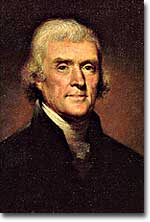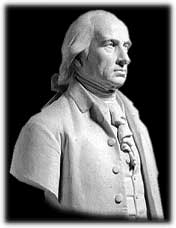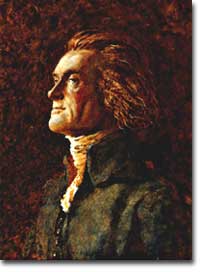
20. Jeffersonian America: A Second Revolution?

Thomas Jefferson, the author of the Declaration of Independence as well as a slaveholder, was a man of many contradictions.
The harsh public antagonism of the 1790s largely came to an end with the victory of the Democratic- Republicans in the 1800 election. "The Revolution of 1800," as Jefferson described his party's successful election many years later, was "as real a revolution in the principles of our government as that of 1776 was in its form."
To Jefferson and his supporters, the defeat of the Federalists ended their attempt to lead America on a more conservative and less democratic course. Since the Federalists never again played a national political role after the defeat in 1800, it seems that most American voters of the era shared Jefferson's view.

James Madison continued the line of Virginian presidents by succeeding Thomas Jefferson.
Jefferson's election inaugurated a "Virginia dynasty" that held the presidency from 1801 to 1825. After Jefferson's two terms as president, he was followed by two other two-term Democratic-Republicans from Virginia, James Madison and James Monroe. Regular Democratic-Republican majorities in Congress supported their long rule. Political leaders and parties played a pivotal role shaping the new nation because they could serve as outlets for large numbers of people to express their opinions about issues of public significance. For Jefferson, the election of 1800 stands as a second revolution that protected and extended the gains achieved in the Revolution of 1776.
Jefferson and his values serve as a useful organizing tool to think about the changes that America experienced in the first decade of the nineteenth century. Jeffersonian Democracy refers to an American ideal as well as to a remarkably successful political movement. At the heart of both meanings of the term lies the household farm worked by ordinary families. Jeffersonian America marked a victory for common farmers as both the ideal embodiment of the American citizen and as a practical reality of who voted. As a result Jeffersonian America required that new western farmlands be cultivated as an absolute necessity for the future of the republic.

"Time indeed changes manners and notions, and so far we must expect institutions to bend to them. But time produces also corruption of principles, and against this it is the duty of good citizens to be ever on the watch, and if the gangrene is to prevail at last, let the day be kept off as long as possible." -Thomas Jefferson, 1821
Although Jeffersonian Democracy remains a greatly celebrated American ideal, it is important to recall that in its own day, as well as today, it drew intense criticism. Federalists never again controlled national politics like they had in the 1790s, but they remained an important force in American life and offered deep criticism of many Jeffersonian developments. The federal government itself embraced this ongoing disagreement. The Chief Justice of the Supreme Court throughout the Jeffersonian Era, John Marshall, was an ardent Federalist. Even while his political opponents controlled elected national office, Marshall consistently supported the supremacy of national power over the states. He led the court in establishing legal precedents to support this view.
The most serious flaw in the "second revolution" of Jeffersonian America, however, came from its embrace of slavery. The party's national leaders were slave-owning elites who had no intention of including African-Americans in their broadened commitment to democracy. Jefferson probed the fundamental contradiction between slavery and democracy more eloquently than any American of the day. This led him to conclusions that were far less than revolutionary. Jefferson repeatedly acknowledged that slavery was wrong, but he never saw a way to eliminate the institution.
To Jefferson, slavery meant holding "a wolf by the ears." It was a danger that could never be released. Most disturbingly of all, Jefferson could not imagine America as a place where free blacks and whites could live together. To him, a biracial society of equality would "produce convulsions which will probably never end but in the extermination of one or the other race."
Jeffersonian America is a term that helps us enter the contested and deeply contradictory nature of the United States at the start of the 19th century. Grappling fully with its meaning requires the use of sophisticated analytical skills that assess both its strengths and its weaknesses. To merely celebrate or condemn, seeing one side, but not the other, is to judge without attempting to understand.
Seeing how the best and the worst of Jeffersonian America were deeply intermixed, and continue to inform American life in our transformed circumstances of the 21st century, is among the most important purposes of historical inquiry.





